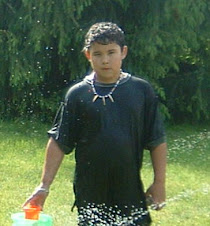 Day 14 came in with a vengeance. Mr. T had a rash over his right eye for the past few days. This morning he had a lot of pain in that area. I noticed that his eyebrow and eyelid were swollen...so I told the nurse I wanted to see the doctor. As soon as Dr. D came in.......he said.."That's Zoster...Shingles...he has the chicken pox virus!"
Day 14 came in with a vengeance. Mr. T had a rash over his right eye for the past few days. This morning he had a lot of pain in that area. I noticed that his eyebrow and eyelid were swollen...so I told the nurse I wanted to see the doctor. As soon as Dr. D came in.......he said.."That's Zoster...Shingles...he has the chicken pox virus!"Right away they started him on verconazole and acyclovir as this is a viral infection. Chicken pox can be deadly for bone marrow transplant patients as they have no immune system to guard against it.
Once you have chicken pox as a child....it lies dormant in your nervous system for years and shows up when it wants to. The pain is excruciating! Mr. T can't stand the light in his face or eyes...or loud noises.
They moved in another clothes hamper (in our cell) so that my gowns can go directly into it as well as Mr. T's bedding. Now I'm in a lot of pain from constantly whacking my ankles on all the sharp objects in this room. I also have to bathe him wearing gloves as this viral infection can be only transmitted through contact.
Later we had to go down to Nuclear Medecine to have a GFR done. This is done to determine why he is retaining fluid in his kidneys.
Glomerular filtration rate (GFR) is the volume of fluid filtered from the renal (kidney) glomerular capillaries into the Bowman's capsule per unit time.[1]
Glomerular filtration rate (GFR) can be calculated by measuring any chemical that has a steady level in the blood, and is freely filtered but neither reabsorbed nor secreted by the kidneys. The rate therefore measured is the quantity of the substance in the urine that originated from a calculable volume of blood.
Renal function, in nephrology, is an indication of the state of the kidney and its role in renal physiology. Glomerular filtration rate (GFR) describes the flow rate of filtered fluid through the kidney. Creatinine clearance rate (CCr) is the volume of blood plasma that is cleared of creatinine per unit time and is a useful measure for approximating the GFR. Both GFR and CCr may be accurately calculated by comparative measurements of substances in the blood and urine, or estimated by formulas using just a blood test result (eGFR and eCCr).
The results of these tests are important in assessing the excretory function of the kidneys. For example, grading of chronic renal insufficiency and dosage of drugs that are primarily excreted via urine are based on GFR (or creatinine clearance).
Up to now....Mr. T hasn't been really sick...aside from the diarrhea and throwing up constantly. Now the real fight begins!
They will be giving him back his PCA. They took it away 2 days ago...as they felt he wasn't using it enough...and didn't want him to rely on it.
Now because of the excruciating pain......they will give it back & he can adjust the hydromorphone he receives.
PCA stands for “Patient Controlled Analgesia.” This type of pain control allows the patient to self-administer effective doses of medicine for pain. The pain medications are given to the patient through an IV (which means “intravenous” or “in the vein”). When the patient feels pain and needs pain relief from the medication, then he or she pushes a small button that is connected to a pump device that controls the IV at the bedside. By pressing this button, the pain medication is automatically delivered into the patient’s vein. When the medication arrives in the veins, it travels throughout the body and pain relief begins to work. Because the PCA enables the patient to control his or her own pain as needed, the patient does not have to rely on the nursing staff to administer the needed drug.
Dr. M from Cheo came to visit us again today. It is so nice to see a familiar face. Mr. T hopes (he insists) to go back to Cheo as soon as possible. I think she was shocked to see him with Shingles. She told us to insist that he get pain medication when he needs it. He was only getting 1cc every hour of hydromorphone and now he will be getting 2cc. Even putting a cold pack on his forehead is painful. For several days now...Mr. T doesn't watch television. He sleeps and wakes only when the pain is too hard to handle or to urinate.
Let the battle begin!




1 comment:
Hi Matty and Tayten. Sorry to hear that the treatment is so awful and that you have Shingles. I am not a fraction as brave a the two of you. We keep praying, but feel it is so little in the light of your suffering.
Post a Comment